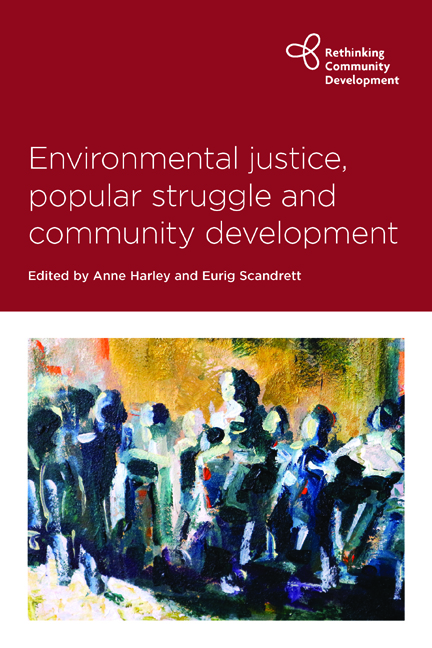Book contents
- Frontmatter
- Dedication
- Contents
- List of figures
- Series editors’ preface: Rethinking Community Development
- Preface
- Acknowledgements
- Notes on contributors
- Abbreviations
- One Community, development and popular struggles for environmental justice
- Two Resisting Shell in Ireland: making and remaking alliances between communities, movements and activists
- Three ‘No tenemos armas pero tenemos dignidad’: learning from the civic strike in Buenaventura, Colombia
- Four No pollution and no Roma in my backyard: class and race in framing local activism in Laborov, eastern Slovakia
- Five Tackling waste in Scotland: incineration, business and politics vs community activism
- Six An unfractured line: an academic tale of self-reflective social movement learning in the Nova Scotia anti-fracking movement
- Seven ‘Mines come to bring poverty’: extractive industry in the life of the people in KwaZulu-Natal, South Africa
- Eight Ecological justice for Palestine
- Nine Learning and teaching: reflections on an environmental justice school for activists in South Africa
- Ten The environment as a site of struggle against settler-colonisation in Palestine
- Eleven Communities resisting environmental injustice in India: philanthrocapitalism and incorporation of people’s movements
- Twelve Grassroots struggles to protect occupational and environmental health
- Conclusion
- Index
Three - ‘No tenemos armas pero tenemos dignidad’: learning from the civic strike in Buenaventura, Colombia
Published online by Cambridge University Press: 27 April 2022
- Frontmatter
- Dedication
- Contents
- List of figures
- Series editors’ preface: Rethinking Community Development
- Preface
- Acknowledgements
- Notes on contributors
- Abbreviations
- One Community, development and popular struggles for environmental justice
- Two Resisting Shell in Ireland: making and remaking alliances between communities, movements and activists
- Three ‘No tenemos armas pero tenemos dignidad’: learning from the civic strike in Buenaventura, Colombia
- Four No pollution and no Roma in my backyard: class and race in framing local activism in Laborov, eastern Slovakia
- Five Tackling waste in Scotland: incineration, business and politics vs community activism
- Six An unfractured line: an academic tale of self-reflective social movement learning in the Nova Scotia anti-fracking movement
- Seven ‘Mines come to bring poverty’: extractive industry in the life of the people in KwaZulu-Natal, South Africa
- Eight Ecological justice for Palestine
- Nine Learning and teaching: reflections on an environmental justice school for activists in South Africa
- Ten The environment as a site of struggle against settler-colonisation in Palestine
- Eleven Communities resisting environmental injustice in India: philanthrocapitalism and incorporation of people’s movements
- Twelve Grassroots struggles to protect occupational and environmental health
- Conclusion
- Index
Summary
Introduction
From 16 May to 6 June 2017, the Colombian Pacific port city of Buenaventura bore witness to one of the country's most important social struggles of the 21st century. For 22 days, the majority Afro- Colombian and indigenous population engaged in a civic strike that paralysed the city, and with it the country's most important port: virtually all businesses were closed; all public transport suspended; up to 70 community roadblocks shut down traffic within the city, including halting the transit of more than 2,600 trucks that carry goods into and out of the city's port every day. The demands of the ‘Civic Strike to Live with Dignity in Buenaventura’ were centred upon improving living conditions through basic public services and infrastructure for the city's population, and increasing popular participation in decisions over the city's territory and environment that have been increasingly affected by corporate infrastructure projects and the expansion of the port. Participation in the strike snowballed, and within two days had effectively become a generalised, joy-filled uprising, involving people from all demographics and all neighbourhoods across the city and rural communities lining the main highway out of the city. In the days that followed, the population would come face to face with the brutal tactics of the Colombian state in its attempts to generate terror and quell the strike, and remain steadfast in the face of live bullets, tear gas and riot vans.
As sites of struggles for social transformations, and as spaces often characterised by alternative, oppositional norms and value practices, social movements produce unique types of knowledge, often overlooked by academia. Reflecting on social movement praxis, then, is an inherently useful undertaking. This chapter thus reflects on the Buenaventura strike. Both authors were members of the Buenaventura civic strike human rights monitoring committee, and witnessed at first hand everything from the state violence (including tear gas and use of live ammunition) to negotiations with government and meetings of the strike committee. In our reflections we use an approach developed by Mathers and Novelli (2007) specifically for the purpose of studying social movement ‘strategies and practices’. Rather than an intervention into the activist world from the standpoint of the academic world, the approach seeks to ‘transverse both worlds through the development of roles such as “activist-researcher”’ (Mathers and Novelli, 2007: 230).
- Type
- Chapter
- Information
- Publisher: Bristol University PressPrint publication year: 2019



